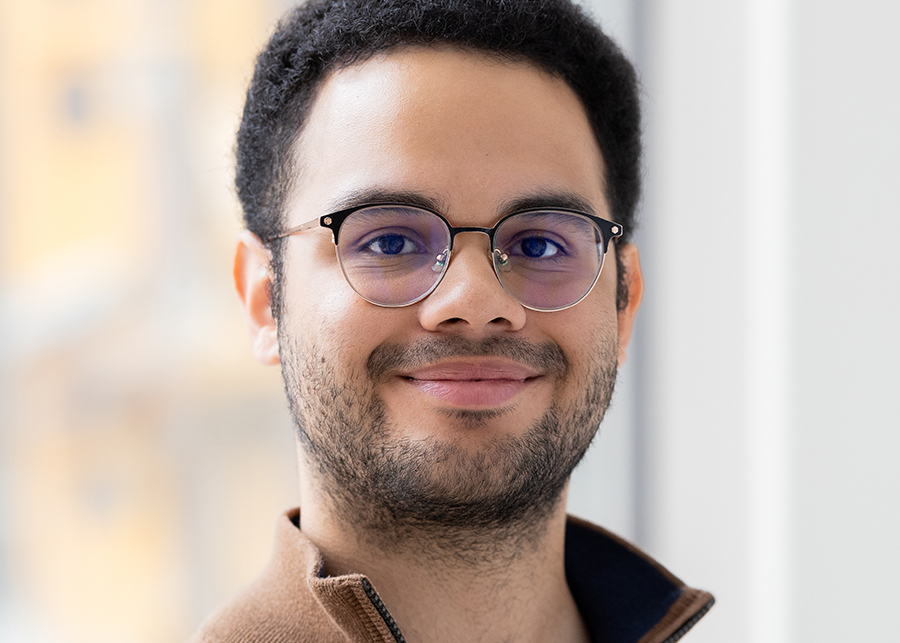
Bachelor of Applied Arts and Sciences, University of Pennsylvania ’23; Concentration in Physical and Life Sciences
Joe Barreto (BAAS ’23) was ready for a traditional college experience when he graduated high school: he had a full scholarship to study biomedical engineering at Drexel University and a long-term vision for his science career. “I definitely wanted to work in a lab space, a hospital space, or something where I'm dealing with applications of biology in person,” he recalls. But Joe decided to revise his college plan when his family needed him: he moved to Puerto Rico to be a full-time caretaker for his grandmother and enrolled in chemistry courses at a local college to keep working toward his goals. He planned to eventually transfer back to Drexel—until the pandemic began. Penn’s Bachelor of Applied Arts and Sciences degree allowed Joe to transfer his college credits and continue pursuing his science education online. “I think one of the biggest parts that I liked about my degree is the transition that I made from being a caretaker to being a scientist, and how smoothly I was able to navigate that with the help of the faculty and the curriculum just aligning well with my interests,” he says. “I think it could have been a lot more difficult had I chosen a different path.”
At Penn, the first course that Joe completed was Foundations of Life Science, which Joe says accomplished in 8 weeks what most programs would do in a full year of biology and biochemistry. “We got a really nice overview in those eight weeks of every topic of biology,” he says. “The final project in that was pretty extensive, but it just felt super enriching. I remember thinking, wow, this science thing is working. I could probably do this professionally.” At that time, Joe has not yet worked in a scientific setting—but that would quickly change. While he still worked as a caretaker, he took a part-time internship as a lead grant writer with a biotech company and participated in a research project about Alzheimer’s disease progression. He spent a summer working with a radiological sciences laboratory at Stanford University—an experience he has presented at the National Collegiate Research Conference at Harvard University. Eventually, he was able to move to Philadelphia to work in a research laboratory at Penn. A summer research fellowship with MindCORE turned into a full-time year-round position in neurobiological research—and when his laboratory moved to University of Colorado, Joe went too. “It certainly was difficult at times to manage all of my different sets of tasks that I needed to complete,” he reflects. “It is okay to slow down the degree at times if you need to. I just think the degree offers so much flexibility that it is a lot easier than doing an in-person degree with all of your in-person work.”
Joe focused on the Physical and Life Sciences degree concentration. “My goal with the degree was to as closely as possible emulate a typical Bachelor of Arts in neuroscience, and the coursework actually ended up being surprisingly similar to the in-person program at Penn,” he says. “A lot of the professors teach the same classes and so I feel like that goal was really met.” Joe completed the Advanced Certificate in Neuroscience, exploring both the pharmacology branch that built on his chemistry knowledge and the behavioral branch that supplemented his understanding of animal research. “Seeing stuff from my neuroscience classes directly happening in lab or recognizing stuff from a paper because I studied it and I worked with it, just made it feel very worth it,” he says. “Having taken those classes, I was noticing that at work I was that much more informed already.” His favorite course from the series is Psychopharmacology, which presented students with a different drug and disorder each week, and assigned a set of scientific papers about them. “The instructor gave us a template that helped explain the rationale behind every experiment in a paper,” he says. “Learning how to digest information in scientific publications super fast is something that I still use directly in my work, and I anticipate using for the rest of my scientific career.”
In addition to the Advanced Certificate in Neuroscience, Joe completed requirements for certificates in Science Foundations, Data Analytics, and Leadership and Communication. “Whenever we take on a new student, a new graduate student, or even postdoctoral fellows, I'm usually the one that trains them on the surgical techniques in the lab,” explains Joe. “Being able to delegate work, train them without diverting focus from my own projects too much, balancing those sort of workplace things, that's what I got from the leadership lessons classes at Penn.” Joe also took a number of courses in social sciences and humanities; synthesizing information across fields, says Joe, works different parts of the brain. “You get to grow and be more of a diverse scholar with different things behind you,” he adds.
Joe completed his coursework in December 2023, and was named Dean’s Scholar in 2024. “I feel honored. I think it's an incredible privilege to have, and it just makes all of the work that I did during undergrad to balance everything feel just worth it,” he says. “I feel more knowledgeable. I feel more skilled. I am excited for my future.” What the immediate future holds for Joe is the application process to PhD programs in neuroscience—an academic pinnacle he has dreamed of since high school. “I used to almost lose sleep over it, thinking about my potential to get into a PhD program,” he says. “And now with all of the work that I've been able to do with the University, I think my chances are higher and I'm just very excited about that, especially.”
